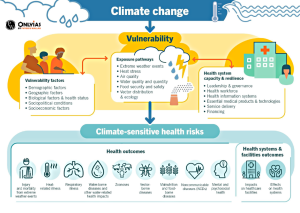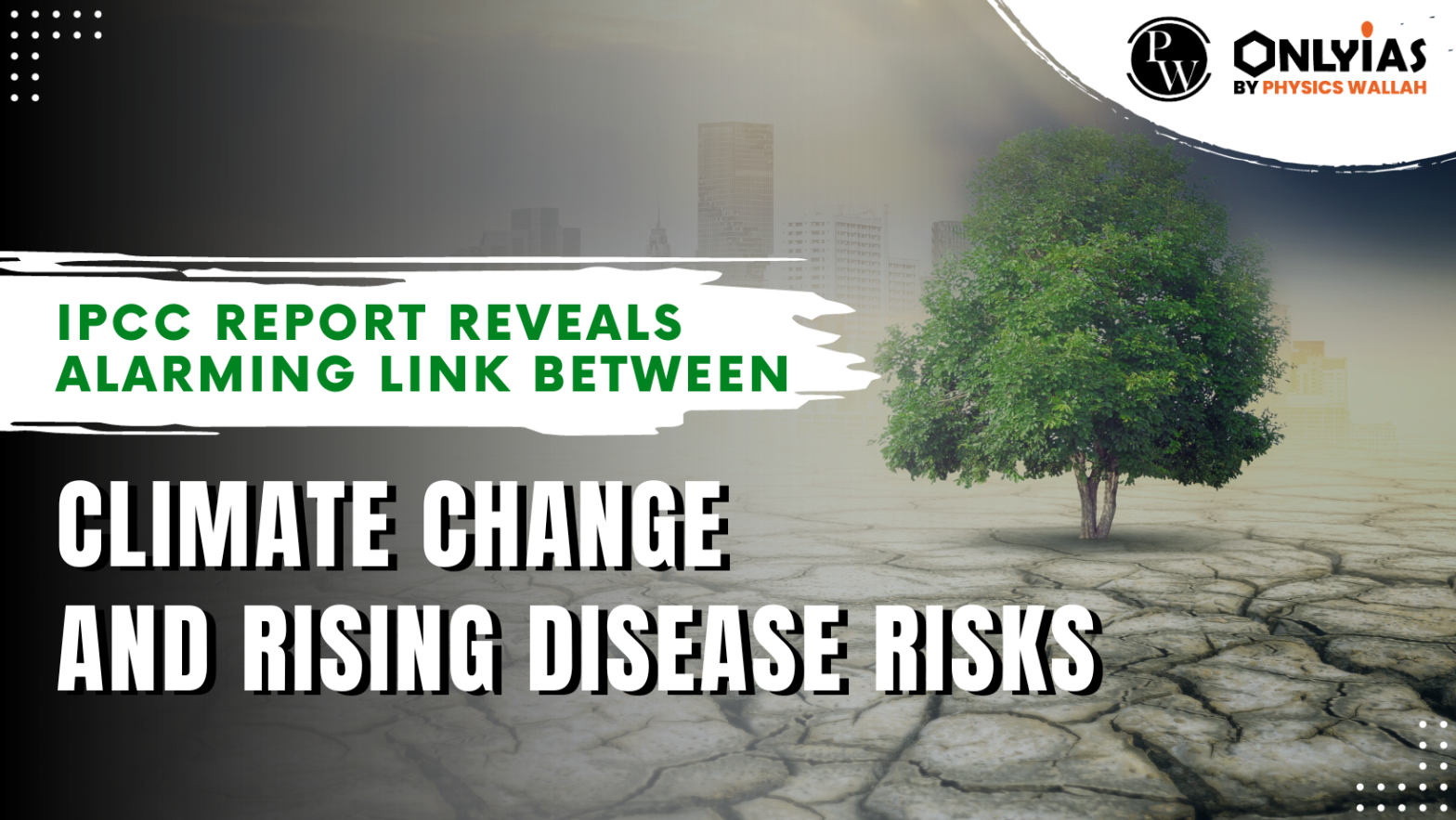Context:
| Relevancy for Prelims: Intergovernmental Panel on Climate Change (IPCC), Disease X, Integrated Disease Surveillance Programme (IDSP), Integrated Health Information Platform (IHIP) and One Health Approach.
Relevancy for Mains: Climate change and new infections and disease scenarios, India’s taken initiatives in this direction and need for a One Health approach. |
How Does Climate Change Drive the Spread of Infectious Disease?
- Habitat Loss: It forces disease-carrying animals to encroach upon human territory, increasing the risk of human-animal interaction and the transfer of pathogens from wildlife to humans.
- Frequency: Over half of all-known infectious diseases threatening humans worsen with changing climate patterns.
- Transmission of Diseases:
- Routes: It includes environmental sources, medical tourism, and contaminated food and water.
- Factors: Variability in temperature, precipitation, and humidity disrupt disease transmission cycles. Heat has been proven to interfere with the genomic structure of pathogens, changing their infectivity and virulence.
- Interconnection between Ecosystem & Climate Change: While ecosystems shape local climates, climate change is transforming ecosystems.
- This dynamic introduces invasive species and extends the range of existing life forms.
- ‘Disease X’ and Beyond: It is the familiar annual cycles of known agents such as influenza, measles, Japanese encephalitis, dengue, diarrhea among others that will continue to test the public health system.

Also read: IPCC seventh assessment cycle
What Are the Key Challenges in Effectively Combating the Spread of Infectious Disease?
- Not adequate Real-time Tracking: The programme, which would have enabled real-time tracking of emerging disease outbreaks, has not delivered on expectations.
- Lacking on Surveillance: The current design of surveillance is not adequate for the emerging disease scenario.
- Multi-pronged Impacts: Climate change is not just limited to infectious diseases but also exacerbates injuries and deaths from extreme weather events, respiratory and cardiovascular diseases, and mental health issues.
- For example: The re-emergence of Nipah in Kerala is a wake-up call, that mere biomedical response to diseases is inadequate.
What Steps Has India Taken to Monitor Disease Outbreaks?
- Experiencing Impacts: India has already faced adverse impacts, with early summers and erratic monsoons causing water scarcity across the Gangetic plains and Kerala.
- Observed Manifestation: These climatic shifts are manifesting in severe health crises, including a dengue epidemic in Dhaka (Bangladesh) and Kolkata and the Nipah outbreak in Kerala.
- India’s taken steps in the Desired Direction: Over the past two decades, India has improved its reporting of outbreaks.
- The Integrated Disease Surveillance Programme (IDSP) was rolled out in a few States in 2007.
- A new, web-enabled, near-real-time electronic information system called Integrated Health Information Platform (IHIP) was launched in seven States in 2018 to present disaggregated data to its users.
One Health: India’s Path to Infectious Disease Control Synergy
- So far, the Office of the Principal Scientific Adviser to the Prime Minister has been taking this lead but with new World Bank and other large funding in place, this will need greater coordination and management.
- Synergy: India must launch One Health and infectious disease control programmes by building greater synergies between the Centre and States and their varied specialized agencies.
- Robust Surveillance Systems: Animal husbandry, forest and wildlife, municipal corporations, and public health departments need to converge and set up robust surveillance systems.
- Responsible Coordination: Above mentioned institutions need to build trust and confidence, share data, and devise logical lines of responsibility and work with a coordinating agency.
How Can India Mitigate Climate Change-Induced Diseases in a Timely Manner?
- Need Adequate Strategies: Changed disease scenarios require a revision of strategies to detect and deal with them.
- Time to Mitigate: Mitigating the spread of climate change-induced diseases requires safeguarding ecosystems, curbing greenhouse gas emissions, and implementing active pathogen surveillance.
- Need of a Unified Approach: A unified approach, termed One Health which integrates monitoring human, animal, plant, and environmental health is the must of the hour.
- This approach is pivotal in preventing outbreaks, especially those that originate from animals.
- It encompasses zoonotic diseases, neglected tropical diseases, vector-borne diseases, antimicrobial resistance, and environmental contamination.
Conclusion
Protecting ecosystems, fostering collaboration, and embracing the One Health paradigm could be the best defenses in the face of a changing climate and the growing threat of infectious diseases. There is a need to take concerted efforts, not just to adapt but also to proactively safeguard our planet and its inhabitants.
| Attempt the PY Prelims Question:
Q. In the context of India’s preparation for Climate-Smart Agriculture, consider the following statements: (2021)
- The ‘Climate-Smart Village’ approach in India is a part of a project led by the Climate Change, Agriculture and Food Security (CCAFS), an international research programme.
- The project of CCAFS is carried out under Consultative Group on International Agricultural Research (CGIAR) headquartered in France.
- The International Crops Research Institute for the Semi-Arid Tropics (ICRISAT) in India is one of the CGIAR’s research centres.
Which of the statements given above are correct?
(a) 1 and 2 only
(b) 2 and 3 only
(c) 1 and 3 only
(d) 1, 2 and 3
Ans: (d)
Attempt the Mains Question: “Climate change’ is a global problem. How India will be affected by climate change? How Himalayan and coastal states of India will be affected by climate change?” (GS Paper 3: UPSC Mains 2017) |

